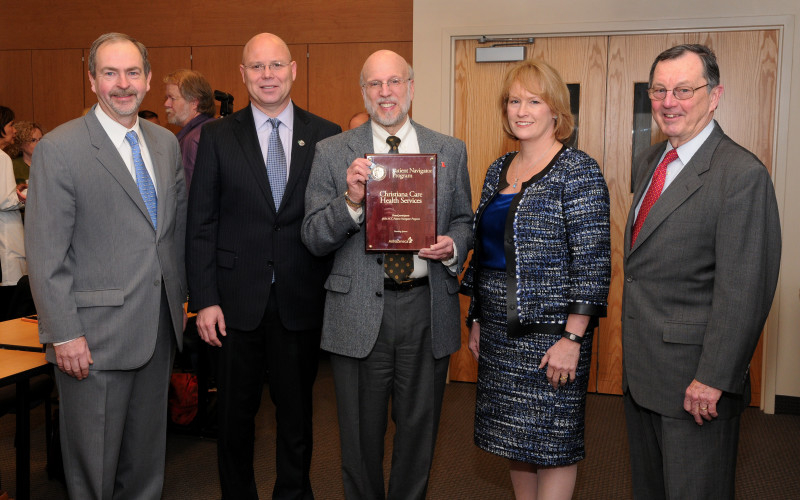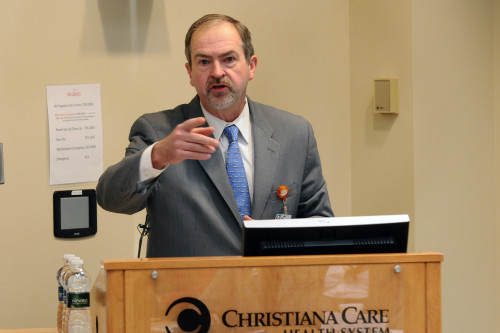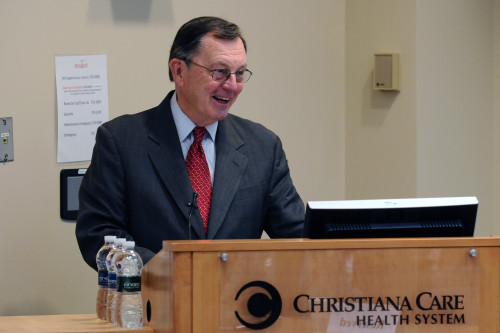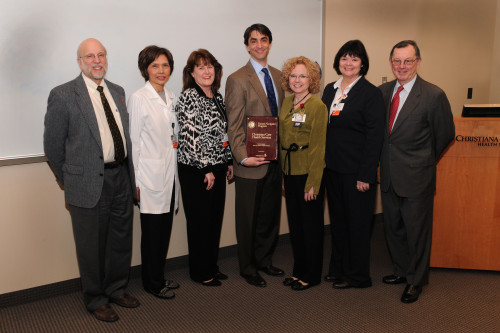New Patient Navigator Program will help patients to stay healthy at home after leaving the hospital

Christiana Care officially launched its Patient Navigator Program during a news conference Feb. 19 at the John H. Ammon Medical Education Center at Christiana Hospital.
Christiana Care is one of 15 hospitals selected out of 132 eligible hospitals nationwide by the American College of Cardiology to participate in this new program, which is designed to keep patients healthy at home after discharge from the hospital. AstraZeneca is the founding sponsor of the ACC Patient Navigator Program.
“You see the word ‘partner’ highlighted during this event, and that is a key word in The Christiana Care Way,” said Robert J. Laskowski, M.D., Christiana Care president and CEO. “That is a word that guides us every day, and today we’re grateful to partner with the American College of Cardiology and AstraZeneca and be part of their excellent work.”

The Patient Navigator Program supports patients who are at increased risk for readmission by helping them to overcome challenges during their hospital stay and in the weeks following discharge. A team of caregivers partners with patients to help them understand their health condition, care plan and medications, and how to use community resources.The program supports a culture of patient-centered care at Christiana Care that serves as a model for other hospitals.
“The Patient Navigator Program helps us advance our efforts to provide innovative systems of care that our neighbors value,” said Tim Gardner, M.D., executive director of Christiana Care Health System’s Value Institute and medical director of Christiana Care’s Center for Heart & Vascular Health, which will lead the program. “We have the opportunity through this program to provide patients with the support and guidance they need when they are discharged so they can remain in their homes with their family and can focus on recuperating.”

Nationally, nearly 1 in 5 patients hospitalized following a heart attack and 1 in 4 patients hospitalized with heart failure are readmitted within 30 days of discharge, often for conditions seemingly unrelated to the original diagnosis. Readmissions can be related to issues such as weakness and physical frailty upon discharge, lack of understanding of discharge instructions and an inability for the patient alone to follow discharge instructions.
“We want our neighbors to be able to stay home and get the resources they need to stay healthy,” said William Weintraub, M.D., chief of cardiology and director for the Christiana Care’s Center for Outcomes Research. “We are honored that the American College of Cardiology selected Christiana Care for this program and are tremendously grateful to AstraZeneca for funding it.”

Christiana Care was selected because of its commitment to quality, as demonstrated by participation in the National Cardiovascular Data Registry and Hospital to Home program. An additional 20 hospitals are slated to join the program by the end of 2015.
“We’ve been very selective in where we bring this program, and the fact that we’ve chosen Christiana Care is a credit to their innovation,” said Shal Jacobovitz, CEO of the American College of Cardiology. “We expect this program to reduce readmissions and move the needle in terms of helping us reach the Triple Aim in medicine.”
The “Triple Aim” concept is defined as delivering health care that improves the individual patient experience, improves the health of populations and reduces the per-capita costs of care for populations. Christiana Care established the Value Institute two years ago to study and design solutions for conundrums that arise in the real world settings of health care delivery while also focusing on balancing our neighbors’ perceptions of the value of care against measurable benefits and costs.
The announcement was covered by WDEL and the News Journal.